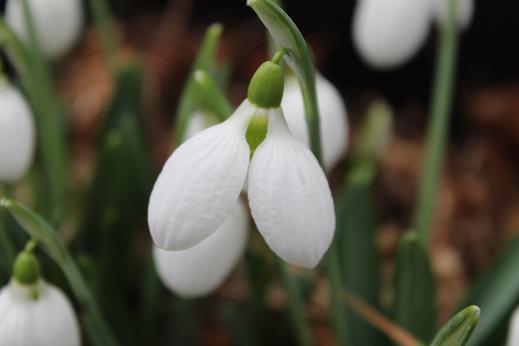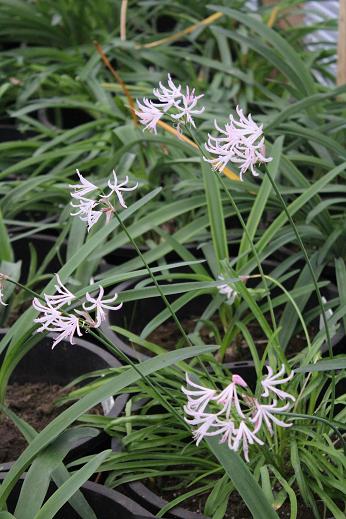JEARRARD'S HERBAL

14th December 2014
Camellia cuspidata
The end of the year is in sight and the garden is winding down. I am still running about the place like a mad thing but it is time to let it be. The garden has been calm for weeks,
waiting for the first touch of winter and it is time to take the hint.
Cold frosty nights will continue to be a distraction over the coming weeks but the sigificant things in the garden are less well defined. Leaves have fallen and the ground is clear of
herbaceous growth. It is like drawing the curtains in the morning and letting the light in. There is magnificence in the air, waiting for the right moment to show itself in the smallest details.
In 2012 I bought a small plant of Camellia cuspidata and it has had two years growing in the greenhouse. There was no point putting it out as a young plant, even with a cage
around it. The rabbits always seem to get to them. In the greenhouse it has reached about a metre tall and produced enough of a trunk to resist their grazing. Next spring it will go out
and we will see if it continues to produce these cheery flowers at the end of the year.
Part of the attraction is the satisfyingly thin and straggling growth. It restores a sense of shrubbiness to the genus. So many of the cultivars of C. japonica sit in the garden
like fat dogs beside a table, silently begging for scraps. Filled with a sense of the elegance and charm of C. cuspidata I went out into the garden to poke fun at the stout
shapes of C. japonica. I found them sparkling with vitality, the sunlight running rings around their perfect leaves. It was an unexpected detail. The garden is full of them.
The round buds are creaking with emormous swelling flowers. The fat dogs will return.

14th December 2014
Fuchsia excorticata
It has been a good year for Fuchsias. Plants outside started flowering early following a mild winter, and they have continued. 'Lechlade Magician' has shed almost all of its leaves
but continues to produce flowers from the tip of every branch. It would make a stylish Christmas Tree, ready decorated. It is a hybrid of F. excorticata and inherits the peeling
bark and blue pollen of that parent. Tiny details that give me great pleasure. Unfortunately fuchsia growers do not generally like the great shrubby ones and people who like great shrubby
things do not generally like fuchsias so 'Lechlade Magician' slips down the crack between ignorance and indifference. From time to time I see one in a garden and know that if I met the
gardener, we would exchange knowing glances.
F. excorticata is a Christmas stocking of delightful details. Shiny green flowers with blue pollen spring directly from the stems in January. It has very few admirers
but every time I find a flower I am filled with joy. If we get a frost the buds will be blasted but new ones continue to grow until the end of February so that any mild spell in winter
could produce a few.

14th December 2014
Galanthus 'Three Ships'
The evenings are dark. I stomp around the garden at the end of the afternoon trying to snatch a few moments doing something useful out there but I usually end up sitting on a log watching
the colour drain away. The last things to go are a few nodding snowdrops.
'Three Ships' is an early form of G. plicatus found at Henham Park in Suffolk. The rounded flower is quite unlike the slender outline of G. elwesii growing a few
feet from it. I have only had it for a couple of years but it is increasing rapidly. A single bulb in 2012 has grown into a small clump and it seems to be reliable, opening just before Christmas.
It is probably a bit early to be thinking about spring but I enjoy these first snowdrops. It feels very luxurious to be able to focus on these small details while the garden is bare.
When I get the chance I will fill these quiet weeks with early snowdrop cultivars and then complain that there is never enough time to just sit and enjoy the simple things. One
of the wry pleasures of sitting in the dark garden is seeing these things in the distance.

14th December 2014
Nerine 'Elspeth'
Even the Nerine are packing up for the year. The last few flower spikes are opening but most of the display has finished. I try to make a few new crosses every year and the seeds have already
ripened. Last week I sowed half a dozen pots and before long the grassy shoots of the seedlings will appear.
I haven't been able to track down any information about 'Elspeth'. It is a very late flowering cultivar so I assume that N. undulata has played a significant part in its ancestry. It may
even be a selection of that species, though the flowers are a little odd.
The first time it flowered it caught my eye and stuck in my mind, I have no idea why. The flowers are small and look a bit ragged. The foliage is quite ordinary. I don't understand it, but it stuck.
A few years on and the small bulbs have multiplied to form a clump. It is still not spectacular but I am glad to have it.
I lay in bed one night last week worrying about a frost that didn't arrive. It was enough to make me sort out some fleece to cover over the Nerine leaves. I don't think it will be needed yet
but it is good to have it to hand just in case. If the leaves get frosted next years bulbs will be much smaller.




